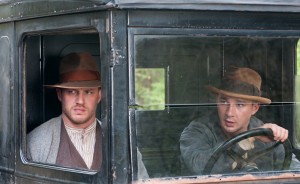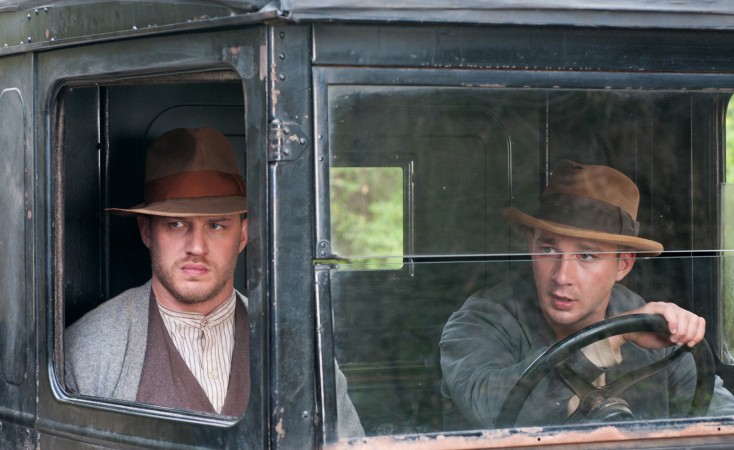
(L-R) TOM HARDY and SHIA LaBEOUF star in “LAWLESS.” ©Richard Foreman, Jr., SMPSP/The Weinstein Company.
By JAMES DAWSON
Front Row Features
HOLLYWOOD—Musician/writer Nick Cave’s image may be that of a sometimes intensely grim performer who has fronted the Bad Seeds since the 1980s, released a 1996 album titled “Murder Ballads” and was described as a “harbinger of the gothic psycho-sexual apocalypse” in an NME review of his 2008 CD “Dig!!! Lazarus Dig!!!” But appearing at a press junket for the new movie “Lawless,” the unexpectedly affable Australian was funny, animated and genuinely seemed to be enjoying himself.
In addition to writing the movie’s screenplay (adapted from Matt Bondurant’s novel “The Wettest County in the World”), Cave composed its score with longtime collaborator Warren Ellis. The two also wrote the music for “Lawless” director John Hillcoat’s 2005 “The Proposition” (written by Cave) and 2009 “The Road.”
Entering a room full of journalists, the dark-browed Cave jokes, “Oh, I didn’t bring my answers!” Sunglasses dangle from his half-unbuttoned purple-striped shirt. His black blazer matches his straight, slicked-back hair. A large gold bracelet watch completes his vampire high-roller ensemble.
Told that he seems nothing like his media image, Cave jokes, “You wait ’til the sun goes down. It gets ugly.” He then says he doesn’t really care what people think, but that those who have followed his lengthy music career “understand that what I do is actually full of humor and light and this sort of stuff. There’s a dark element as well, obviously, but there’s a lot more to it than that.”
Cave notes that he originally had no interest in “doing someone else’s story,” but was convinced to adapt Bondurant’s bestseller because it had the kind of elements that appeal to him and Hillcoat: “filmic lyricism” and “brute violence.” “Lawless” is the fictionalized account of three moonshine-making brothers who plied their dangerous trade in rural Virginia during the Prohibition era.
Even with “The Proposition” under his belt, Cave says, “I think what I have over a lot of other script writers is I don’t actually know how to write a script. So I’m not sort of self-censoring myself a lot of the time.” He adds that “on some level, that’s quite a good way to approach anything: as an amateur and an outsider.”
He still regards moviemaking as an extracurricular interest and music as his career.
“I think that scriptwriting of anything is a craft, in the sense that you’re really a functionary that’s serving a greater machine, and your heart and soul is not even really wanted,” he says.
Instead of missing the kind of control he has when writing songs, Cave says he enjoys working with director Hillcoat and the producers to bring their visions to the screen. “It’s actually a huge relief to have that responsibility taken away, and that you’re just doing something for somebody else.”
Adapter Cave had no contact with author Bondurant until “Lawless” was finished and both were doing interviews at the Four Seasons Hotel in Beverly Hills to promote it. “I’d never met him, I never talked to him. I didn’t even know who he was,” Cave says. “I’m standing there, he goes ‘I’m Matt Bondurant.’ I’m like, ‘Oh, hi.'”
With the exception of dropping a plot about a contemporary writer doing research, Cave says his first draft of “Lawless” was very faithful to the book.
“Then the producers and everyone said, ‘All right, that’s all very nice, you’ve done that,'” then they asked for rewrites to make the story more cinematic. “I was pretty much given permission to do what I’d like, but I tried to keep pretty faithful to that story, and to the spirit of the Bondurants.”
Tom Hardy, who was the occasionally unintelligible villain Bane in “The Dark Knight Rises,” plays the gruff Forrest Bondurant in “Lawless” with a sometimes similar mush-mouthedness.
“The whole kind of grunting and all of that sort of stuff was something that I think initially mystified everyone,” Cave recalls. “But I think he was playing the long game, and he really understood this character…because when it was cut together, it was like, ‘This is ****ing incredible, this performance.’ And that to me is what a great actor can do. You don’t really want someone to walk in and do what you think they should do, you want someone to come in and blow you away. And that’s what Tom Hardy did.”
Cave notes that some of Hardy’s frames of reference at first seemed bizarre to the filmmakers. During rehearsals, he says Hardy mentioned “wanting to play Forrest like an old lesbian. And we’re kind of like, ‘Okay…’ And then at another point, he said, ‘Actually, I’ve changed my mind. Now I want to play it like the little old lady in Tweety-Pie. You know, like Sylvester and Tweetie-Pie, that’s who I want to base this character on.’ I’m like, ‘Okay…'” Cave says the choices ended up making sense because Forrest is a matriarchal figure trying to hold his family together.
Discussing the movie’s Prohibition setting, Cave says “it still exists today with the so-called war on drugs. It was a disastrous policy then, and it’s still a disastrous policy now, as far as I’m concerned. It doesn’t work.”
The film’s eclectic score includes two unusual versions of Lou Reed’s “White Light/White Heat,” one a country ramble by Cave and others as The Bootleggers, and the other a quietly stripped-down rendition by bluegrass legend Ralph Stanley.
“Ralph had heard our versions of ‘White Light/White Heat’ that we’d played, and we wanted him just to sing on top of these versions,” Cave says.
That suggestion was shot down, and so were attempts to get Stanley to sing the song in the key of C or in 4/4 time. But Cave describes the eventual nearly a capella version that Stanley delivered as “incredible.” Reed, who was recording nearby at the time, “came into the studio and heard it and was in tears.”
As for what Reed thought of Cave’s own version of the song with The Bootleggers, Cave says, “I didn’t play him that. I’m not that ****ing courageous!”





